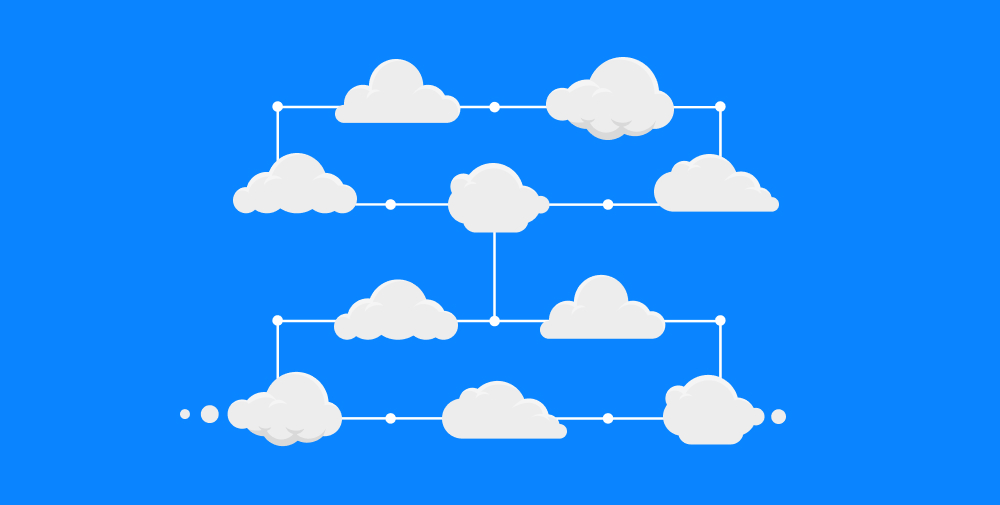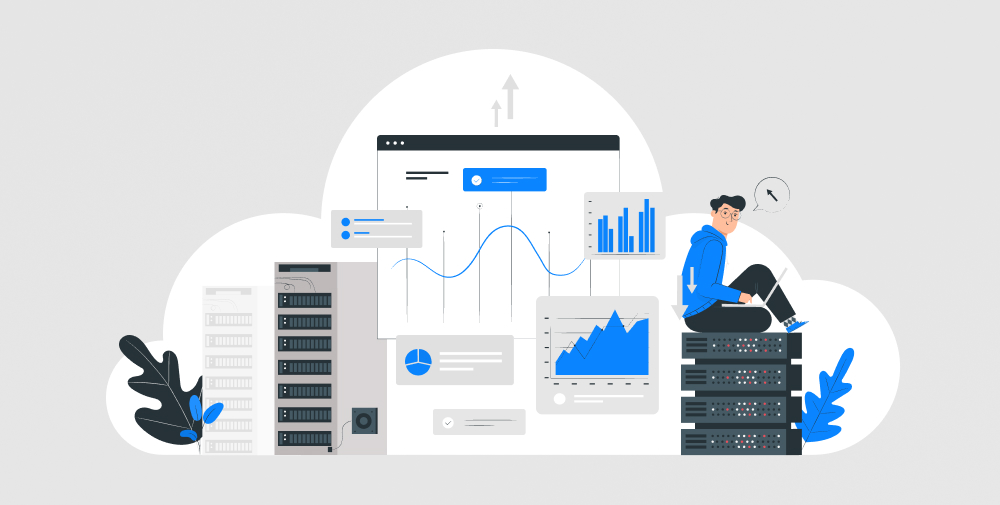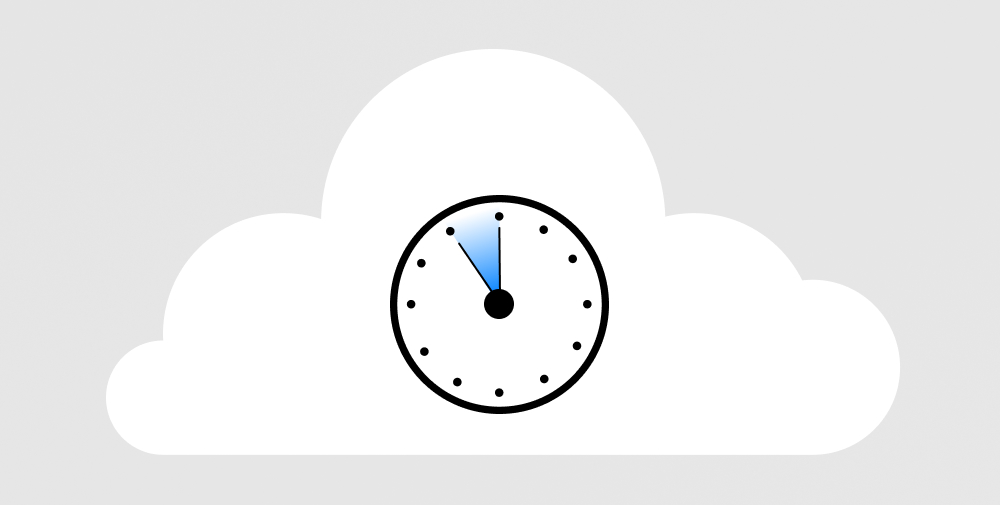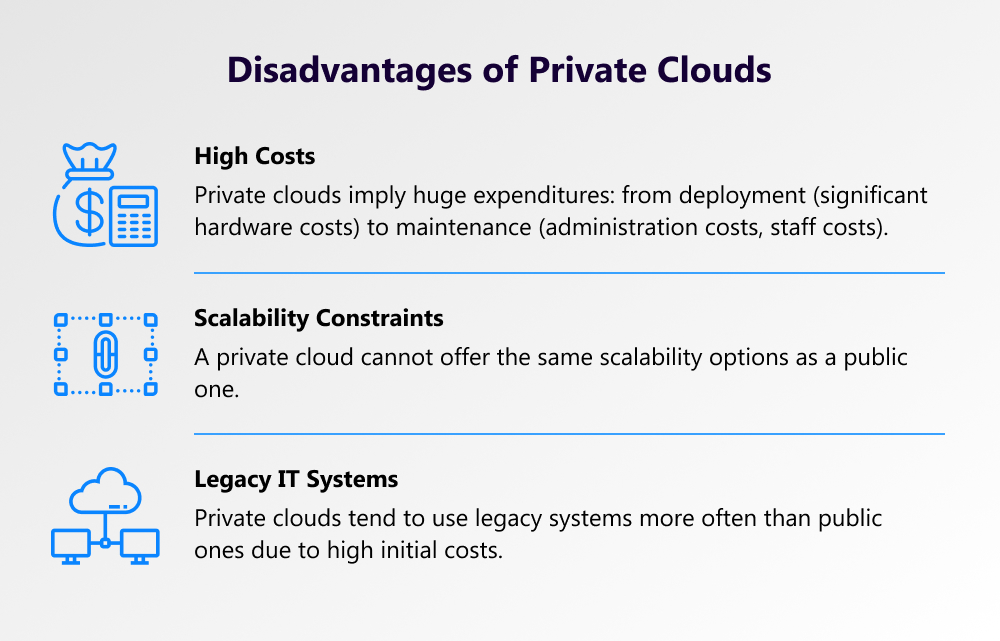Cloud services can undoubtedly increase the potential of businesses of all sizes. CEOs are tirelessly trying to find out which type of cloud computing model can be a real game-changer for their business, without putting data at the risk of loss, since this can happen even to the most reliable service providers. However, although cloud computing has been in the IT industry for almost 20 years, the debates over the technology continue.
written by:
Anastasia Borodinets
Cloud services can undoubtedly increase the potential of businesses of all sizes. CEOs are tirelessly trying to find out which type of cloud computing model can be a real game-changer for their business, without putting data at the risk of loss, since this can happen even to the most reliable service providers. However, although cloud computing has been in the IT industry for almost 20 years, the debates over the technology continue.
This article covers key things to know about the private cloud, which is the most secure and reliable option for businesses wishing to harness the power of cloud computing. Firstly, we’ll take a glance at three existing types of clouds. Then we’re going to describe the major benefits of private cloud computing. To make the picture complete for you, we will also shed some light on its main disadvantages. Read on to get a bird’s-eye view of private cloud computing and make well-balanced business decisions.
What You Need to Know Before Adopting a Private Cloud
Although a private cloud is the No. 1 option to us and we recommend it to the vast majority of our clients, it is more because of the specifics of our client base — 80% of them are banking, finance, or FinTech businesses. Like any other tech, in addition to a wide range of benefits, private cloud computing has its cons which affect the selection of a specific cloud-computing model at each specific enterprise.
However, the cloud solution that we recommend may not be an option for you. For instance, some businesses can satisfy their needs using a quite cheap public cloud, unlike those who are involved in processing sensitive data and certainly need an expensive private solution that provides enhanced data security services. Thus, before you grab the most costly cloud, let’s go through the list of all the cloud options out there.
What’s the difference between public, private, and hybrid clouds?
Let’s have a glance at all of them.
Three Types of Clouds and How They Differ
Public Cloud
The public cloud is a type of computing service where a service provider offers resources and functionality (for instance, infrastructure, data storage) to the public over the Internet. The main advantages are flexibility, endless scalability, and reduced costs for maintaining IT personnel. The main challenges are the lack of complete control on the part of the customer, with the data transfer rate depending on the speed of the Internet connection available.
Private Cloud
Another type of cloud service, the private cloud gives the same advantages to the user as the public cloud, but only through a proprietary architecture. Under this model, all servers are owned and managed only by one user. In most cases, the private cloud is on-site but it also can be off-site. The scenario is appropriate for enterprises that put more trust in internal IT departments than external service providers. The major advantages are top-class security control and high-speed operation. The disadvantages are expensive hardware and software, and maintenance staff.
Hybrid Cloud
This is the third type of computing environment that combines an enterprise’s private cloud and third-party public cloud services into a powerful single infrastructure. The benefits are security, scalability, and resource optimization. The disadvantages are overly complex security, snd complicated integration of public and private clouds.
So, we’ve had a glance at the strengths and weaknesses of each type of cloud. Now as you know them all, you can make a more weighed business decision
Still willing to try out a private cloud despite the costs? Well done! For those who choose the second option, we have prepared a detailed description of its key benefits.
Benefits of a Private Cloud
Security and Privacy
It’s not a secret that over the last several years AWS, Dropbox, GoGridand, and many others have been victims of security breaches that have destroyed their customers’ reputations. This is why many corporations are considering that the private model proves less risky.
Yes, security is a great advantage and probably one of the most significant benefits of the private cloud over the public cloud. You can save and manage your data on the servers access to which is available only for your company. This significantly improves data security.
For those who opt for off-site private cloud servicing, vendors offer extra security options. For instance, AWS mentions “enhanced security options in Amazon VPC”. Sure thing, you still need the staff to deal with administrative issues and overall cloud management. Yet at the same time, the vendor gives you an extra shield, which is a great thing for custom software companies, QA companies, and other IT players dealing with sensitive clients’ data.
 Customization
Customization
Among the major benefits of the private cloud vs public, one can also mention high customization. As each company has its own business requirements, depending on the industry, strategic objectives, and size, they need an infrastructure with specific characteristics. Another great feature of the private cloud is a high customization level. In the private cloud, you can build a system that will perfectly match your needs and interests.
Although customization is more important for big players, as their business needs are dynamically changing, small and medium players will win too. The thing is, besides the infrastructure, customization directly affects the above-mentioned security, too. If you are, for example, a small pharmaceutical lab that doesn’t want to be hacked, tailor-made data back-up, IP address restrictions, and private networking will never hurt.
Strict Regulatory Compliance
There are many organizations whose operation implies storage and processing of sensitive data. Among them are:
- Government agencies
- Health facilities
- FinTech companies
- Banks
- Finance businesses
- Insurance players
- Scientific centers, etc.
For these companies, personal data breaches may not only lead to business interruption but entail legal responsibility as well, as their operation is subject to government regulation.
Different countries have a wide range of specific legal requirements regarding proper data storing and processing. For example, under Russian law, personal data of level 2 security can only be stored in a private cloud. Thus, for some businesses private cloud computing model can be the only realistic option to reach regulatory compliance.
In the public cloud, you have to share hardware resources with rival companies, so no one guarantees uptime for your applications. Unpredictable performance can seriously harm your business by provoking customer outflow. By choosing an isolated private cloud, you get full control over the infrastructure. Predictable performance is an essential condition to meet your business needs.
Minimum Downtime
Did you know that if a website doesn’t respond in 3 seconds, a client leaves? The fault of such client outflow will be in downtime. This is the price that most public cloud users have to pay. What’s more, even Amazon, GCP, and Azure cannot guarantee that you will not face downtime when using their public cloud services. Study these examples, to have a deeper comprehension of the issue. These public clouds suffered huge downtime mainly due to the enormous number of users exploiting the same cloud channel simultaneously. This would not happen in the case of a private cloud.
Seems like we’re done with the subject. But we wouldn’t like you to perceive this article as an ad deprived of objective evaluation. So, below we’ve placed a few most significant drawbacks of private clouds for a real unbiased review of the private cloud.
In the End
In this article, we have shared with you the main pros of implementing a private cloud and briefed you on the key benefits of a public cloud over a private cloud. This type of cloud computing service will guarantee your cloud portfolio is safe and sound 24/7, the services are tailored to meet your business needs, while your operations are compliant with regulatory requirements. Mind that all of the above will cost you some extra money, so be ready to invest heavily in the quality of private cloud services.
However, before we go, we would like to highlight one more thing. Last but not least, private cloud deployment and running can turn out to be too complicated for companies that have no prior experience in handling complex IT systems. Private cloud, despite the tons of its advantages, is not an easy thing to master with its complex configuring (VMware configurations, SAN configuration, etc), multiple interdependencies, and lots of security requirements. In case you need help handling private cloud issues, you can outsource the migration and management of your private cloud to Qulix Systems to get fast and safe support. We have deep expertise in cloud solutions, be it a private, public, or hybrid cloud. Future-proof your business alongside an award-winning partner.
Reach out to our Support Team for more details on our cloud competencies or visit our website to have a look at our portfolio.

Contacts
Feel free to get in touch with us! Use this contact form for an ASAP response.
Call us at +44 151 528 8015
E-mail us at request@qulix.com

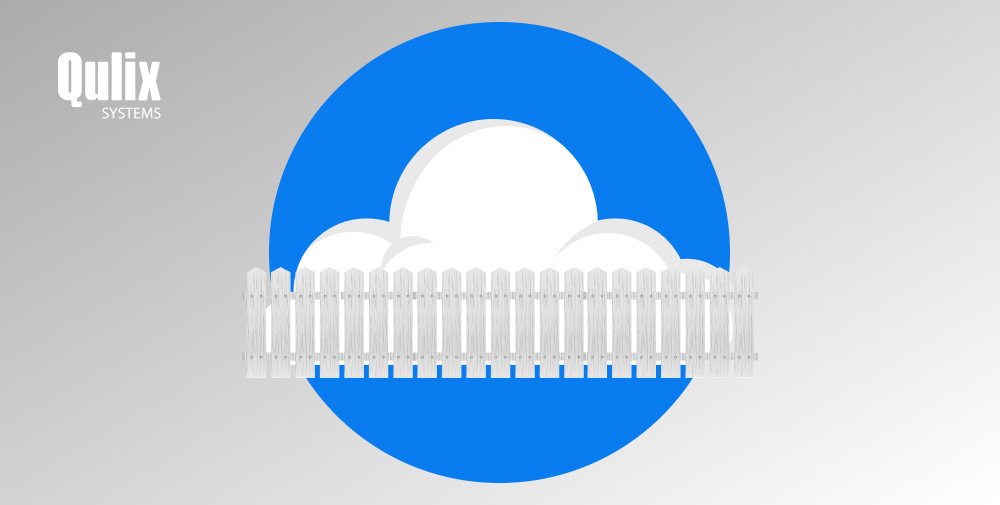


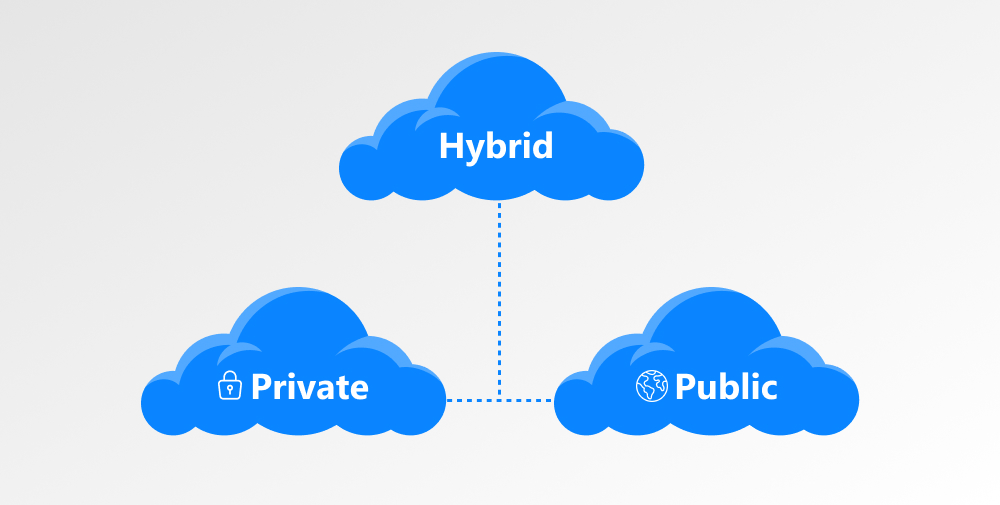
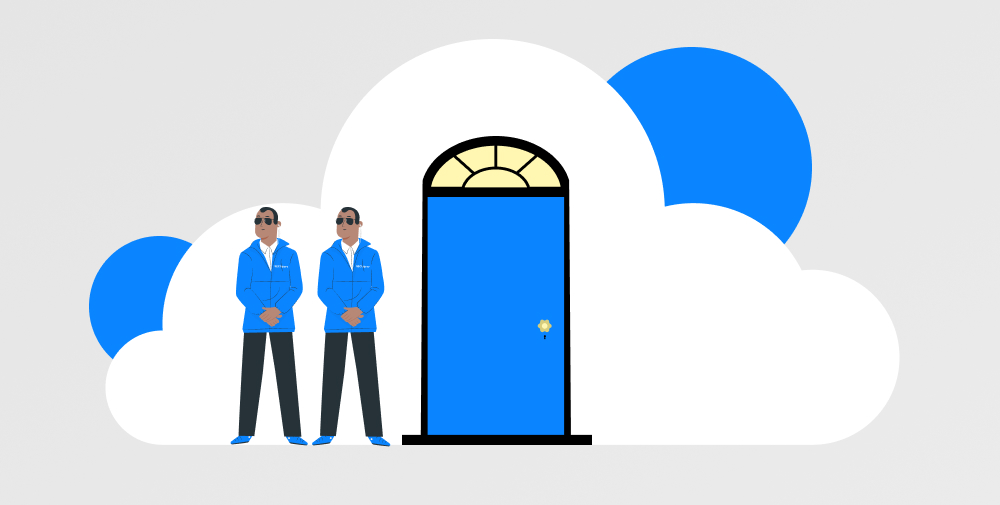
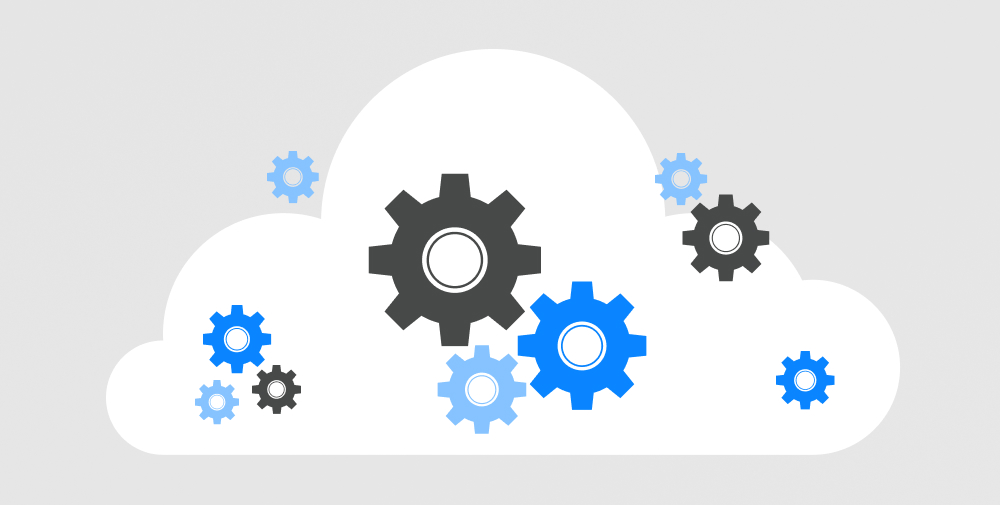 Customization
Customization